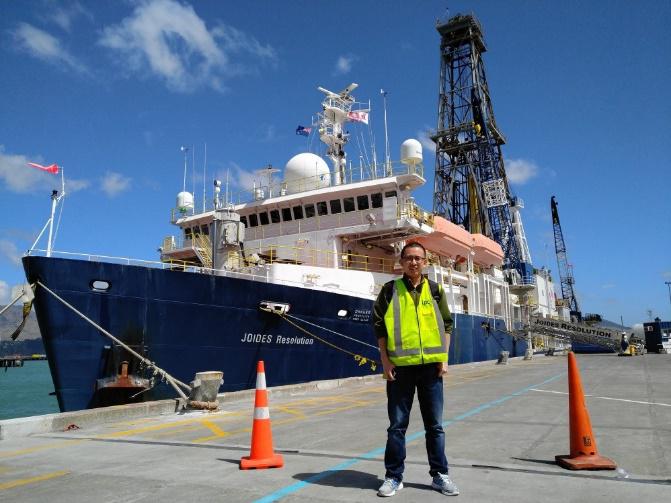Invited FIO Scientist Joined IODP Expedition 374 in Ross Sea of Antarctica
Invited by the International Ocean Discovery Program - JOIDES Resolution Science Operator (IODP-JRSO), Dr. XIONG Zhifang from Laboratory of Marine Geology and Geophysics of FIO joined the IODP Expedition 374 in Ross Sea of Antarctica from 4 January 2018 to 22 February 2018. This Expedition invites Pref. Robert McKay from Victoria University of Wellington, New Zealand and Pref. Laura De Santis from National Center for Ocean and Applied Geophysics, Italy as the chief scientists, and aims to investigate the relationship between climatic/oceanic change and West Antarctic Ice Sheet (WAIS) evolution through the Neogene and Quaternary. Researchers drilled continental margins of the Ross Sea in 5 stations (U1521-U1525), which have various sea-water depth, in line with their latitude distribution. The 1,300-meter high-quality rock cores were acquired and shared by on-board scientists. By using knowledge of paleoclimate, paleoceanography and method of numerical modeling, they re-established the evolution history of western Antarctic ice sheet expansion/collapse, evaluated its driving mechanism to global ice volume and sea level changes, and identified the feedback principle of it to the marine-climate factors (e.g. changes of temperature and earth orbital parameters).
On the drilling vessel “JOIDES Resolution”, Dr. XIONG is an inorganic geochemical scientist. His mission includes the geochemical composition analysis of sedimentary elements in every station; physical/chemical analysis of sediment pore water; writing of reports/summaries according to the station data; and exchange and cooperate with other scientists on board. According to scientists’ preliminary discussion, he will receive more than 1,200 samples of rock core from 2 drilling stations. These samples will be used to rebuild the circulation status of deep Antarctic Ocean from the Neogene and Quaternary, level of surface productivity, changes of nutrients utilization, and help to find its controlling effect on pCO2 of glacial cycles.
Although scientists were aware of the Antarctic Ocean’s driving force in climate change long time ago, compared with other oceans, it has less research outcomes for lack of rock cores due to the extreme weathers. Therefore, the long-time serial sediment samples acquired during this expedition are quite precious.
The International Ocean Discovery Program (IODP, 2013-2023), developed from the Ocean Drilling Program (ODP, 1983-2003) and Deep Sea Drilling Project (DSDP, 1966-1983), is the largest and most influential international cooperative research project in the history of earth sciences, which makes breakthroughs in geoscience over and over again. IODP’s Science Plan from 2013 to 2023 identifies 14 challenge questions in four areas of climate change (understanding of ocean/ atmosphere evolution), deep life (deep-sea biosphere), planetary dynamics (earth connections), and geohazards (deep process and impacts on earth surface). China joined ODP in 1998, becoming the first member of ODP, and joined IODP in October of 2013. Now, IODP is joined by 26 countries, including the United States, Japan, 18 European countries, China, Australia, ROK, Brazil, and New Zealand.
The Laboratory of Marine Geology and Geophysics of FIO has long encouraged young scientists to join IODP. Till now, 5 researchers have been involved in the “JOIDES Resolution” expedition.

Ready to board the “JOIDES Resolution”

Process sediment pore water samples during the Expedition

Discussion on station data during the Expedition


